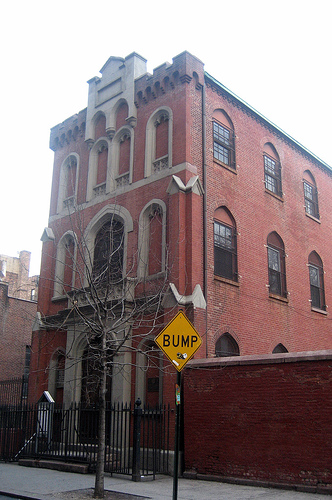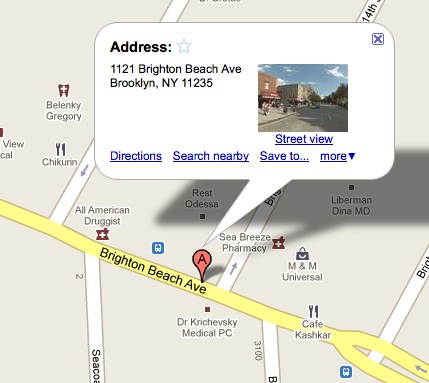From The Integration of Dominican, Chinese, Russian and Mexican Immigrants in NYC
Contents |
An interview with an Immigrant
By Michelle Ranello
(Education) An Interview With an Immigrant
By Michelle Ranello
I interviewed a woman named Alice Gilman. She came here with her parents and sister in 1988. She was 16 and her sister was 5. In Russia at that time it was very difficult to achieve anything if you were a Jew. Russia was a very anti-Semitic country. If you were Jewish you couldn't get into colleges or get the job that you deserved. That is why her parents decided to come here. Alice described America's education system as "terrible compared to Russia." When she first came here she went to into 11th grade in high school. She said that whatever she studied in 6th grade in Russia you take here when your in 12th grade. Math was the easiest subject for her. After high school she ended up going to Baruch for an accounting degree. Because of the education she got in Russia it was easy for her to succeed in America's education system.
(Language)
When Alice Gilman came to America in 1988 she did not know any English. She only new letters and when she came here making it very difficult at first. Her fathers brother came here in the 70s suggested that she should go to school to learn English. She had already graduated school in Russia. So she took an ESL class and didn't learn much. All of her friends in that class were Russian so they didn't need to know English to speak to one another. Alice started working part time after school in the clothing store Rainbow and that is were she started using English.
Labor
When Alice and her family left Russia, you were not supposed to bring jewelry with you. They only let you take $90.00 per person. So they had $360.00 dollars. They had to go through Austria and Italy before they came to the United States. When they arrived gaining a job was a big priority because they need money to pay for rent. It was easy for Alice to get a job once she learned English but her father could not gain a job because he only spoke Russian. Her family had to use an organization named Nayana to gain help. They gave her family money but it was still not enough to pay for rent. Her relatives had to also give them money. When her parents finally did start working they were able to pay some of the money back to Nayana.
St. Michael's Russian Catholic Church aka St. Michael's Chapel
Interview conducted on April 30, 2010 with Reverend Deacon Christopher LiGreci. It is located in the Soho area of Manhattan on Mulberry Street. They are a branch of the Russian Orthodox Church acknowledging the power of Bishop of Rome, Pope Benedict XVI. The Church accepts all ethnicities and are not limited to only Russians as long as they practice Russian Catholicism.
When asked whether they only lend their services to Russians, he proudly responds that they accept all ethnicities into their community.
''It doesn't matter what they look like what matters is that we are all humans.''
The Church tries to spread the word that their organization is not just confined to people of Russian background. However, the title of their Church, St. Michael's Russian Catholic Church, says otherwise. As a result, they now refer to it as St. Michael's Chapel, a Russian Catholic Community of Byzantine Rite.
How They Help Educate the Russian Population
The St. Michael's Russian Catholic provides both English and Russian classes to their members. They try and schedule these classes mostly over the weekend so that members that live in other boroughs can participate as well. During the weekend, they found attendance rates to reach their peak. People of various boroughs are able to make the trip into Manhattan to attend. They have many members that attend their church services over the weekend and local cathedrals throughout the weekdays.
Most members that reside in Manhattan tend to attend the Russian classes. He has noticed that most Russians in Manhattan are well acquainted with the English language. On the other hand, as distance between a Russian and Manhattan increases, the chances that they are fluent in English lessens. Instead they are more familiarized with their native language, Russian. To promote the preservation of their Russian culture, they do suggest to their members to sign up for the Russian classes. Most of the Russian class are filled with Russians.
According to Deacon LiGreci, he believes that language is probably one of the most difficult aspects of integration. This is partly because there are certain syllables that are not part of the Russian language, but are included in the English language. Furthermore, it is difficult for everyone to understand the difficulties of the English language, that us Americans understand easily. Frustration in both the Russian and English classes are common.
Brighton Beach Neighborhood Association
Interview with Ms. Pat Singer, the Founder & Executive Director of Brighton Beach Neighborhood Association on April 27, 2010.
About Brighton Beach Neighborhood Association and their Services
The Brighton Beach Neighborhood Association is a non-profit organization that strives to make the community of Brighton Beach a better place for both new and current residents. The three main immigrant groups that they focus on are Russian, Hispanic and Middle Eastern. The organization does their best to maximize the Democratic experience of the United States to these immigrants. In addition, they also offer help with:
Social Services: help get into entitlement programs whether its for low-income housing, food stamps, section 8 (a type of Federal assistance dedicated to sponsoring subsidized housing for low income families and individuals)
Housing Advocacy: help you find representation and fight for housing issues as well as educated you on tenant laws and housing rights
Homeowner Counseling: help you receive low-interest loans from the government through the organization's counseling service
Landlord Assistance: help landlord settle disputes with their tenants and also make their buildings handicap accessible
Tenant Organization: help tenants work as a group to address any building problems to enhance their quality of life
Main Struggles for the Organization
Like my other small organizations, BBNA struggles financially. Ms. Pat Singer has to fund her small office located in Brighton Beach with an outstanding annual cost of $38,000 for heat, electricity and rent. She must raise $50,000 a year in order to just barely survive. She says "Right now we're in trouble.." The main source of sponsorships and donations come from the annual Jubilee parade which consists of roughly 100,000 of people. It costs them nearly $15,000 to conduct this parade, but they need to in order to keep the organization alive.
Language
Brighton Beach is “the” textbook definition of an enclave community. If you were to go down the streets by the Boardwalk you would see signs completely in Russian. There are individuals who have lived their entire lives in this community without even learning a word of English.
Despite the overwhelming presence of Russian Immigrants, Brighton Beach still is home to a minority population of Pakistanis and Hispanics that is woefully underrepresented by the mostly Russian-born community leaders. Ms. Singer has networked with a motley mix of other organizations to get a wider cultural representation for Brighton Beach.
The language obstacle is one problem that the BBNA tries to address is the ethnocentrism of Brighton Beach. The organization has lobbied for different causes, such as the passing of a law that requires the signs to have English on them. This way, tourists and non-Russian inhabitants won’t be discouraged from shopping in their districts. (Vid2 11:00)
The political processes in Brighton Beach are inhibited by the ethnocentricity. Entire town meetings would be held in Russian, and attended by a virtually 100% Russian audience.
The dominance of the Russian population in Brighton Beach politics ensures the perpetuation of the enclave community and the non-participation of the other immigrant groups.
Shorefront YM-YWHA of Brighton
An interview with Lawrence Fish, Director of Adult Educational, Vocational and Citizenship Services
Lawrence quotes, “education is the cornerstone of a community.” He explains that in Russia, it is valued more than it is in the United States. A big problem for newly arriving immigrants is that an American college education is far more expensive than in Russia, but at the same time it’s lower quality.
At the Shorefront YM-YWHA of Brighton, they offer free tutoring services to teenagers. This includes helping students with homework, SAT or ACT preparation and college applications. They also stress for the students to give back by volunteering within the community.
These education services also focus on maintaining the Jewish faith among teenagers. Their leadership programs deal with “Jewish identity, history, and tradition.”
The Russian education system is actually considered superior to the American's. 53% of Russian Immigrants bring a College degree with them and 80% already have a high school diploma. This superiority leads to the Russian's relative advantage in finding white collared jobs.




